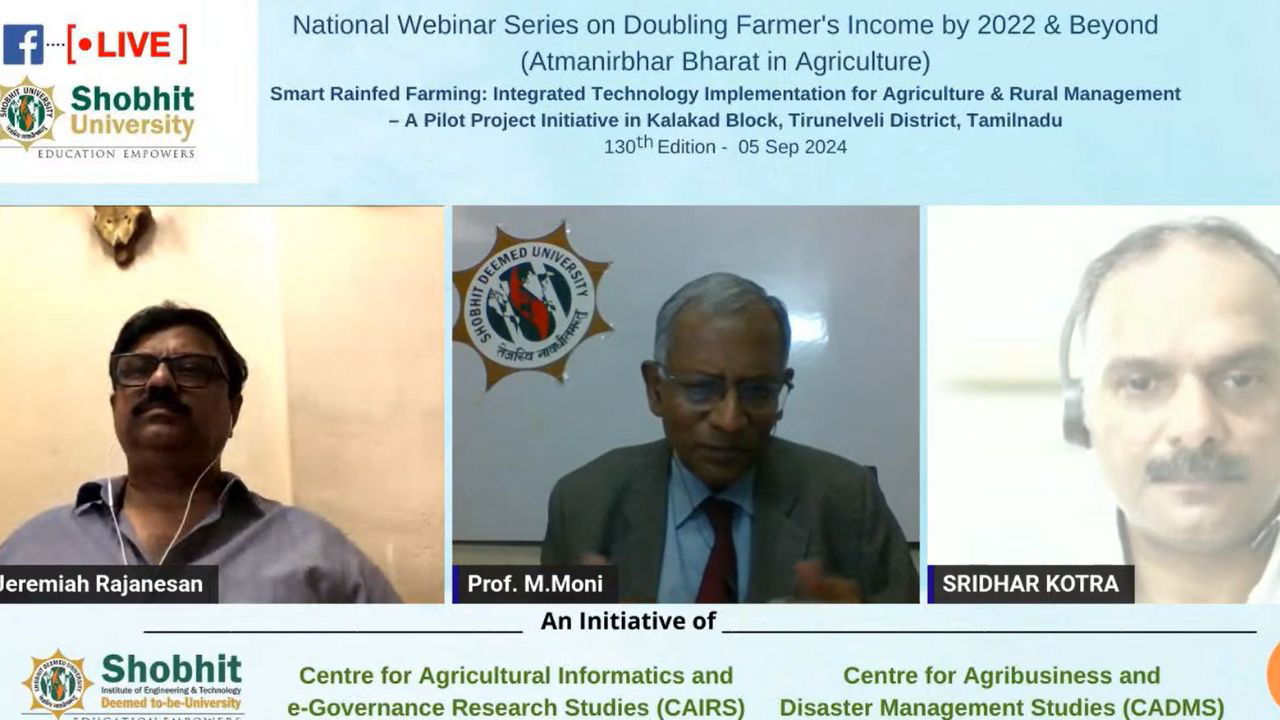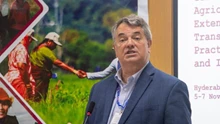
The Centre for Agriculture Informatics and e-Governance Research Studies (CAIRS) at Shobhit Institute of Engineering and Technology (Deemed-to-be University) Meerut, under the leadership of its Chairman, Prof. Moni Madaswamy, successfully conducted the 130th Edition of its National Webinar Series on the theme of "Doubling Farmers' Income by 2022 and Beyond." The event was held virtually on September 5, 2024, at 11 AM.
To begin with, Prof. Moni extended “Greetings for Our Teacher's Day 2024 – 5th September - celebrated on the birth anniversary of Dr. Sarvepalli Radhakrishnan, Our Former President of India”. In his introductory address, Prof. Moni informed that the Doubling Farmers’ Income by 2022 Committee, in its Volume 12-B, has recommended the strategic use of Digital Technology in the Farming System Life Cycle, through “SMART Irrigated Farming” “SMART Rainfed Farming” and “SMART Tribal Farming” as Mission Mode Programs.
The SMART Rainfed Farming Method- A Pathway for Prosperity - is required as rainfed agriculture occupies about 51 percent of country’s Net Sown Area (NSA) to meet food requirements of India in 2050, and as of now, it accounts for nearly 40 percent of the total Food Production. This necessitates “Integration of Digital Agriculture with Rainfed Agriculture”. This will unlock the Opportunities in Rainfed Areas through establishing BHARATNET and AgriTech StartUps in every Gram Panchayats of Rainfed Areas.
The webinar featured distinguished speakers, including Jeremiah Rajanesan, CEO of Dohnavur Fellowship, and Cmde Sridhar Kotra (Retd), who shared insights into leveraging technology for sustainable agricultural practices.
In his presentation, Jeremiah Rajanesan delivered a talk on "Smart Rainfed Farming: Integrated Technology Implementation for Agriculture & Rural Management" with a focus on the Kalakadu region in Tamil Nadu. He emphasized the crucial role of monsoon rains in determining crop choices in rainfed farming systems. Rajanesan highlighted the importance of raising awareness about digital farming among farmers and promoting technology-driven solutions to address challenges from seed selection to harvest and post-harvest management.
Cmde Sridhar Kotra (Retd) discussed that digital technology has played a pivotal role in rural development, and its adoption is essential for the upliftment of the rural sector. However, farmers cannot fully benefit from technological advancements without strong connections to Higher Educational Institutes (HEIs). Currently, only 1-2% of rural areas in India have digital technology penetration. While development is concentrated in certain regions, its benefits are not reaching the end users.
To address this, Cmde Sridhar Kotra advocated 'Smart Village Centre' to be established at the Gram Panchayat level, bringing tech-based solutions to the doorstep of the farmers. This initiative provides access to a wide range of technologies, from seeding to post-harvest solutions. Engaging local students has been a key factor in the program's success. Before planting begins, farmers can use technologies such as satellite mapping and soil testing to analyze both macro and micro-nutrients, as well as soil organic carbon levels. Water and fertilizer management have automated solutions, and Blockchain technology ensures the authenticity of organic produces. Drones are helping to address labor shortages and detect plant diseases early.
He further emphasized satellite based real-time, sample-free soil testing during plant growth helps farmers identify and resolve issues instantly. Accurate rainfall prediction technology allows for optimal timing of fertilizer application. The MIDAS (Multi-Input Data-Driven Advisory System), which facilitates integration of problem specific third party Apps, generates localized schedules in the farmers' native language, and Blockchain integration supports the tracking of carbon and water credits.
The Webinar also sparked a lively interactive session where Prof. Moni Madaswamy suggested that students from biology and economics disciplines at Manomaniam Sundaranar (MS) University Tirunelveli and other institutions be actively involved in the program to help promote sustainable technologies among farmers.
Prof. Samuel Gnana Prakash Vincent, Head of the Centre for Marine Science and Technology at MS University, further added that Agri-metric technology solutions could be implemented internationally. He advocated for the development of sustainable business models and recommended deepening village ponds to at least 20 meters to alleviate water scarcity for farmers.
Dr. Baghya Sharma, from Yenepoya University Mangalore, supported these views and expressed interest in establishing a technology center at her university to benefit farmers.
This Webinar on ‘Smart Rainfed Farming’ spotlighted a need for a pilot project in Kalakadu Block, Tamil Nadu, led by the Dohnavur Fellowship and CAIRS in association with Agri Matrix India Pvt. Ltd. The project intends to demonstrate how integrating cutting-edge technologies like satellite data, soil analysis, and weather forecasting and operationalization of “Digital Technology in Agriculture – 7 Mission Mode Program” to empower farmers and create sustainable agricultural practices for a more secure future. Jeremiah Rajanesan introduced the topic and helped translate it into Tamil for the benefit of the farmers.










